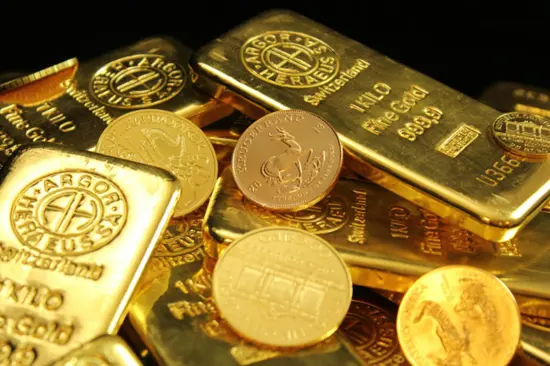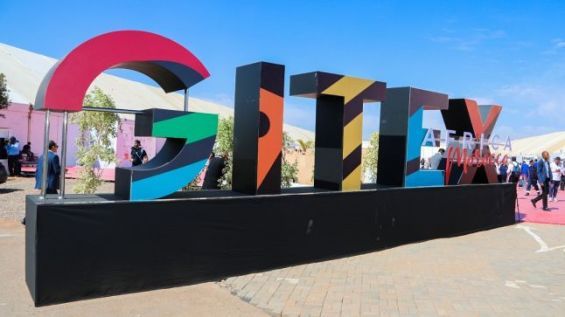By Yvan David Danisa – AfricanTrust
As trade tensions between the United States and China deepen, global financial markets are bracing for turbulence. But one player appears unshaken—gold. And behind its shimmering resilience lies a quiet, strategic accumulation that may redefine the future of global finance.
When U.S. President Donald Trump announced this week that tariffs on Chinese imports would rise to 125%, the already volatile trade war between the world’s two largest economies escalated into uncharted territory. Yet as markets trembled, one asset gleamed brighter than ever: gold. Prices surged more than 1%, pushing spot gold to $3,119.18/oz, and U.S. gold futures to $3,135.50—marking one of the commodity’s strongest performances since October 2023.
Gold is, of course, the quintessential safe haven. But the current surge is not just driven by speculative traders or wary investors. A closer look reveals a deliberate, strategic play by one of the key protagonists in the trade war—China.
In financial circles, China’s gold-buying spree is no longer a secret. Over the past decade, and particularly since 2018—the year Trump’s trade war first roared to life—Beijing has systematically ramped up its gold reserves. According to the People’s Bank of China (PBoC), the country added more than 300 tonnes of gold to its reserves in the last 18 months alone, making it the largest official buyer of gold during this period.
But this isn’t just about asset diversification. China’s strategy is rooted in a long-term vision to de-dollarize its economy and hedge against the economic coercion that a U.S.-led global financial system enables.
When Trump revived the tariff war in 2025 with a 125% hike on Chinese goods, it sent shockwaves through manufacturing, tech, and commodity markets. But unlike 2018, Beijing appears better prepared. The gold accumulation strategy, which began in earnest following the initial trade war, was designed precisely for such geopolitical uncertainty.
Back then, Beijing was jolted by the weaponization of tariffs and trade policy. The idea that access to the global dollar-based system could be leveraged as a tool of geopolitical punishment convinced Chinese policymakers that monetary sovereignty was a matter of national security.
This ushered in a bold plan, boost gold reserves, deepen Renminbi (RMB) internationalization, and reduce exposure to the U.S. Treasury market.
Why gold? Simply put, it’s an asset without a counterparty. Unlike the U.S. dollar or government bonds, gold doesn’t carry the risk of political entanglement or sanctions. It’s a universally accepted store of value with centuries of proven resilience. In times of crisis—whether triggered by inflation, war, or economic retaliation—gold retains its credibility.
China’s pivot toward gold is also a vote of no confidence in the global dollar order. Since 2022, several developing economies, particularly those in Africa, Asia, and Latin America, have expressed concern about the U.S. dollar’s dominance and its ability to destabilize their economies through abrupt monetary policy shifts or sanctions.
In this environment, China isn’t just stockpiling bullion—it’s leading a quiet rebellion against the dollar.
The rise of gold in China’s reserve strategy is a bellwether of a broader shift in global financial architecture. If the Yuan is ever to challenge the dollar as a global reserve currency, it will require a robust, independent financial ecosystem—one backed, perhaps, by gold.
This presents a paradox. On the one hand, we are witnessing increased interconnectivity in global markets. On the other hand, the strategic use of tariffs, sanctions, and currency manipulation has encouraged monetary nationalism.
Gold sits at the center of this tension. The more states like China—and even Russia and India—diversify their reserves into gold, the less leverage the U.S. has over the global economy. This could gradually erode the dollar’s status, reshaping everything from international trade settlements to sovereign lending frameworks—especially in Africa, where China is already a major economic player.
What Happens to Gold Now? According to analysts, gold may well hit $3,200/oz before the end of the month. But beyond short-term price movements, the trend is unmistakable. The central banks are buying more gold than ever before. In 2024 alone, global central banks acquired more than 1,000 tonnes of gold—a record not seen in modern times.
Edward Meir of Marex notes, “If we enter a slow growth period—which is now our base case—interest rates will eventually head lower, and gold will rise. Inflation may not vanish with tariffs inflating costs globally.”
At the same time, U.S. inflationary pressures could keep interest rates higher, which traditionally dims gold’s appeal. Yet even in that scenario, the political value of gold as a tool of economic independence may outweigh its cost of carry.
For African economies—especially those rich in gold like Ghana, South Africa, and Sudan—this trend presents opportunities and challenges.
On the upside, higher gold prices could boost exports, stabilize currencies, and attract investment into mining and refining sectors. However, the rising global scramble for gold also means increased pressure on governance, transparency, and sustainability in resource extraction.
Moreover, if financial deglobalization accelerates, African nations may find themselves caught in a multipolar monetary tug-of-war, forced to navigate between Western dollar hegemony and emerging Sino-centric alternatives.
China’s rush to gold is not just a defensive maneuver—it’s part of a grander strategy to realign the world’s financial fault lines. Whether this ushers in a more multipolar, equitable system—or deepens fragmentation and rivalry—remains to be seen.
But one thing is clear: gold is no longer just a commodity. It is a weapon, a shield, and perhaps, the currency of a new era.
As prices soar and uncertainty reigns, one must ask, Are we witnessing the return of the gold standard—not by decree, but by stealth?
Published in AfricanTrust – where Africa’s markets meet global insight.




